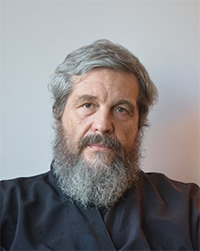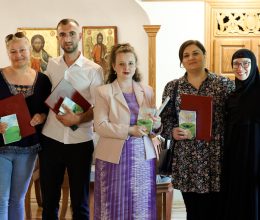The published text is a response to a question posed to Father Nikolai Ludovikos, addressing the challenges faced by parents and educators regarding the constant time children spend in front of computers.
Replacing One Love with Another
I believe it is crucial to consider what we replace when we take something away. One love can only be overcome by another love. The question is not about taking something away from the child but rather about what we place in its stead. In other words, what kind of criteria will we instill in them?
Education begins at an early age; the child must be taught to have high standards—both aesthetic and spiritual. If you hand over the child to television from a young age, “it will crush them”. Television, which operates on the most basic human instincts, either terrifies and crushes through aggression or, conversely, creates a false sense of safety: “Look, they are being killed, but you are safe“; “Look, you can imitate the one who kills at this moment, and you remain safe without being in danger!“

And when the aggression becomes overwhelming, television shifts to sexual scenes. It switches you from one thing to another and bombards you with consumerist suggestions during the breaks. Consumerism is a kind of mysticism. Television shifts the child—from aggression to sexual scenes, and then to consumer consciousness and back.
This can destroy the inner world of any person before they even turn 15 years old. So much so that by the age of 15, the child may seem wild, without ever having intended it. If we do not offer them other things that will interest them, other principles, if we do not teach them to draw grace, to have other criteria, to engage in other processes… if we start lamenting when the child is already 20 or 30 years old, it is too late.
As I mentioned, I teach at the university. I am not a monk; I am married and have children. I experience this as a personal problem. I see 18-20-year-olds who seem as if something terrible has happened to them. They are constantly in front of the computer, hypnotized for hours, and even during breaks, when not in front of the computer, they are back on the keyboard (on their mobile phones).
This way of life, in its extreme form, requires intervention from a psychiatrist or psychotherapist; it is a kind of mental illness—a habit that has replaced the child’s real world with the digital, virtual world. They live their life through the computer and cannot imagine that there is another dimension beyond these devices; they are convinced that with their help, they can solve all problems. It is their prayer, thought, fantasy… all combined in one—just by pressing a few buttons. Today’s young person doesn’t even feel the need to win over a classmate or fellow student, as they can get the most beautiful girl with the press of a button, and for a long time. Love is gone too; young people no longer fall in love with each other as they did 30-40 years ago when there was a certain distance.
Where Will It End?
The question is, where will all this lead? We complain that today’s children have problems with concentration, perform poorly on exams, and appear distracted. But this cannot be healed suddenly at the age of 22 or 25; it must begin earlier, with the child being taught what Saint Paul speaks of: “But I will not be mastered by anything” (1 Corinthians 6:12), meaning, I will not allow anyone or anything to rule over me.

The fact that technology serves me means nothing more than that technology helps me in life, but it is not my life. Children need to be taught this. That’s why, when parents ask me for advice, I tell them: “Don’t buy your child a phone at 5 years old. Let them work for it and wait a bit, even if their peers already have one!“; “Don’t buy a computer just because they’ve stopped using a pacifier, because that child still hasn’t developed any criteria and won’t be browsing Plato’s works or Saint Maximus the Confessor’s writings on the internet, but will instead turn to other things closer to the fallen nature of man.” Isn’t it that simple and clear?
We need to instill criteria in children. But in order to do that, we must have them ourselves. If we lack them, if we are confused ourselves, then we will end up like the saying goes: “When the blind lead the blind, both will fall into a pit.” Therefore, I dare say, the big problem today is not the children but the teachers—among them are people who are in a state of tragic spiritual deadlock, passing on that deadlock during lessons, thus destroying souls. Especially in elementary school.
By high school, the child is already spoiled; you can’t spoil them any further. The most you can do is try to help them, to somehow save them, but in any case, the damage is already done. A child who has been supported from an early age can be helped later, says Elder Paisios. But when a child is spoiled from a young age, they have no concept of what things should be like… Today we are talking about such cases. Teachers include parents who only care about making money; now they’ve lost the money, but I don’t know if they’ve also lost that mentality. And the poor children grow up lonely. We are creating generations of abandoned children who, when they take matters into their own hands, will devour us, and will devour each other.
The Deeper Question Behind Technology
But above all, behind all this power of technology lies the big question: Why? The question of meaning. If that question is lost, every achievement of man turns into an end in itself, a mire in which you sink. The question of meaning can be answered, above all, by the Church, by faith in God, by the fact of Christ’s Incarnation. And then, when we have that answer before us, we can use technology as much as we see fit, not as much as it dictates to us.

We need to pass these principles on to children in a beautiful and gentle way, because we ourselves possess them, not by lying to them about things we neither believe in nor live by. Only in this way will the child gradually be convinced, because they are a person and an image of God. And if they are not convinced now, they will be convinced soon enough and will seek something more.
Modern generations are generations that will collapse, will suffer great losses, and those among them who will heal will, with great agony, seek to find something more than all this. And we must be prepared to teach them, which means we ourselves must have advanced in these principles. The problem is not national but concerns the entire Western world. It’s the same in England and the USA; people don’t know how to deal with their children—by 15, the child seems to have “traveled” to another world, doesn’t know where they are, nor can they find you, nor can you find them. But the child is not to blame; you handed them these powers. And after everything, they go on to do anything, even to kill.
You see, the Holy Spirit is not on the internet. If the Holy Spirit were on the internet—fine, but He’s not there. And if He is there, He is in some small corner, but in the meantime, while surfing, the child has discovered all sorts of things that they cannot avoid because they lack the criteria to do so. That is precisely why efforts are needed on our part. There is no self-sufficient way. And if you tell the young person, “I forbid you to use the internet!”, they will just go to an internet café…
Source: pravoslavie.bg

Protopresbyter Nikolaos Loudovikos
Protopresbyter Nikolaos Loudovikos is an Orthodox theologian, philosopher, and professor, renowned for his contributions to theology, philosophy, and psychology. He serves as a professor of dogmatics and philosophy at the Church Academy in Thessaloniki and has lectured at the Institute for Orthodox Christian Studies at the University of Cambridge, as well as at universities in Durham and other higher education and research centers across Europe. His works and research focus on themes such as love, freedom, and the relationship between the individual and the community from an Orthodox perspective. Among his notable works is “A Eucharistic Ontology,” which explores the Eucharistic foundations of Orthodox anthropology and communion, establishing him as one of the leading Orthodox thinkers of our time.















